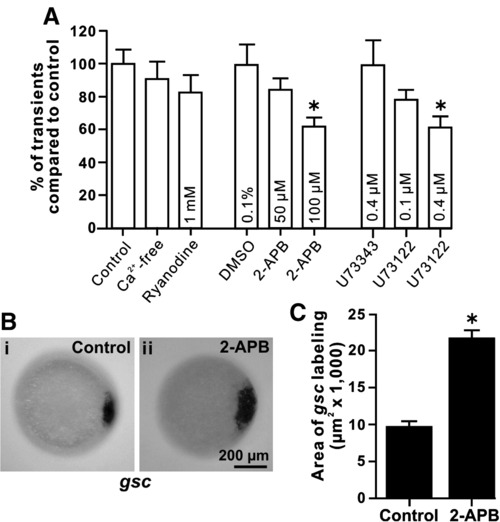Fig. 7
- ID
- ZDB-FIG-090304-83
- Publication
- Ma et al., 2009 - Establishment of a transitory dorsal-biased window of localized Ca(2+) signaling in the superficial epithelium following the mid-blastula transition in zebrafish embryos
- Other Figures
- All Figure Page
- Back to All Figure Page
|
The effect of Ca2+-free conditions, or treatment with ryanodine, 2-APB, U73343 or U73122, on the SEC Ca2+ transients generated during the dorsal-biased Ca2+ signaling window and the effect of 2-APB on gsc expression. (A) Embryos exposed to 100 μM 2-APB or 0.4 μM U73122, but not other conditions, showed a significant decrease (at p < 0.01, as indicated by “*”) in the number of DCW Ca2+ transients, when compared with the corresponding control. Data are expressed as means and SEMs of 5 experiments for each treatment. (B) Expression pattern of gsc in representative (Bi) untreated (control) and (Bii) 2-APB-treated embryos at shield stage. Embryos were treated with 50 μM 2-APB from the 512-cell stage to the high stage. (C) Bar graph to show the area of gsc labeling. The mean ± SEMs of n = 4 (control) and n = 7 (2-APB treated) embryos are shown. The area of gsc expression was significantly increased (at p < 0.05, indicated by “*”) in the 2-APB-treated embryos. |
| Gene: | |
|---|---|
| Fish: | |
| Condition: | |
| Anatomical Term: | |
| Stage: | Shield |
| Fish: | |
|---|---|
| Observed In: | |
| Stage Range: | 128-cell to Prim-5 |
Reprinted from Developmental Biology, 327(1), Ma, L.H., Webb, S.E., Chan, C.M., Zhang, J., and Miller, A.L., Establishment of a transitory dorsal-biased window of localized Ca(2+) signaling in the superficial epithelium following the mid-blastula transition in zebrafish embryos, 143-157, Copyright (2009) with permission from Elsevier. Full text @ Dev. Biol.

